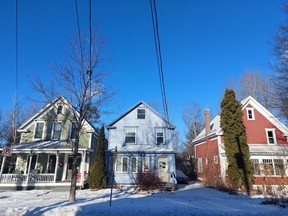Most NBers facing much higher property taxes in 2024
Higher property assessments also mean that most household's net worth has benefited over the last year

Article content
New Brunswick property values went way up again this year, another sign of increased personal wealth but also of higher taxes on the horizon.
On Monday, the provincial government issued assessment notices for more than 479,000 properties, available online and in the mail.
New Brunswick’s overall assessment base – the total value of property assessments in the province – is just over $89 billion, an increase of 10 per cent, or about $8 billion, since last year, according to officials.
It’s the second highest increase in the last 20 years – last year’s was the record – with most of the hikes affecting previously existing homes, not new construction.
As a concerned resident, I’d suggest they reach out to their local governments to get their questions answered.
Mary Wilson
Nine out of 10 New Brunswick property owners who receive their assessment notices this week in the mail should expect to see their property value go up.
Eleven per cent of property owners will see no increase, and only a miniscule 0.2 per cent will receive a decrease, likely because of fire, flooding, or demolition of their properties.
All told, four out of every 10 properties – 205,000 in total – had increases of 10 per cent or more. Most of these property owners will fall under the province’s spike protection mechanism, which will see their assessments increase by no more than 10 per cent until their properties are sold.
Seniors who are 65 and older are eligible for a special property tax deferral program if their assessments have gone so high that they are struggling to pay their bill. But the deferred property tax and interest amounts constitute a lien against the property and become due and payable when the property is sold or transferred. Details are on the province’s website.
People who did major additions or sizable renovations or recently bought their properties are out of luck.
So, while most homeowners’ net worth will likely increase – homes remain one of the biggest single investments people make in life – it also means the majority of those people will probably be paying much higher taxes once they factor in their local tax rate. Most of New Brunswick’s 89 cities, towns, villages and rural districts did not cut their tax rates by 10 per cent.
The province will mail out tax notices March 1.
Mary Wilson, the minister responsible for Service New Brunswick, said her government did not stand to gain from the higher assessments on people’s principal homes because the provincial portion of property tax is only charged on other types of properties, such as apartments and cottages.
She said people who are upset about their high taxes should put those concerns to their elected municipal officials.
The higher property taxes come during a cost-of-living crisis for many people. The Montreal Economic Institute stated in a study just last week that prices had gone up on average across Canada by 16 per cent since the pandemic, much higher than average pay hikes.
“I’d reach out to my local government,” the minister said. “They set the rate on what a homeowner will pay because a homeowner doesn’t pay any provincial property taxes at all. There’s no point coming to us.”
Wilson didn’t want to pass judgment on any local governments for the amount they are charging on their tax rates.
“Well, you know, there are 89 different local governments, I can’t speak on behalf of all of them, I can’t speak on behalf of what their budgets are and their plans, but as a concerned resident, I’d suggest they reach out to their local governments to get their questions answered.”
In what has become a familiar annual blame game in New Brunswick, an official with a municipal organization pointed the finger back at the province, arguing it hadn’t given cities, towns and villages enough authority to raise revenues by other means.
We’re still waiting for the date for the province to start working on the ‘bold fiscal reform’ that was promised.
Dan Murphy
“There’s a challenge for local governments because they’re responsible for delivering local services on policing, roads, recreation and all these other services that have gone up significantly in price these last number of years,” said Dan Murphy, the executive director of the Union of the Municipalities of New Brunswick, which represents most local governments, including all eight cities in the province.
“We’re so reliant on property tax assessments.”
His municipal association and the francophone municipal group have been demanding fiscal changes since the Higgs Progressive Conservative government amalgamated local governments across the province, eliminating about two-thirds of the total in 2023.
“We need other revenues to offset some of the pressure on the taxpayer,” Murphy said. “We’re still waiting for the date for the province to start working on the ‘bold fiscal reform’ that was promised as part of local governance changes.”
Wilson recommended that people who feel their assessments are inflated – assessors are supposed to follow the housing market when coming up with the worth of an individual home – file for a request for review. A property owner who disagrees with an assessment may file a request for review, free of charge, online or by calling 1-888-762-8600. They have a month to do so, with a Feb. 14 deadline.
Officials in her department are preparing for a torrent of requests. Historically, the recent average has been about 6,500 requests for review, but the last couple of years it surged to 9,000 annually.
Only about a quarter of such reviews have led to a reduction in the past.












Postmedia is committed to maintaining a lively but civil forum for discussion. Please keep comments relevant and respectful. Comments may take up to an hour to appear on the site. You will receive an email if there is a reply to your comment, an update to a thread you follow or if a user you follow comments. Visit our Community Guidelines for more information.